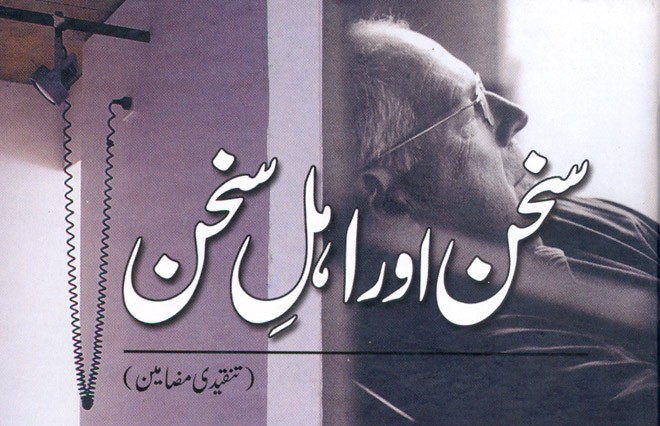
Muzaffar Ali Syed’s distinct assurance on prose and poetry

One of our most well-read and engaging critics, Muzaffar Ali Syed, did his best to make himself less accessible to his readers. He wrote a great deal and had it published in literary magazines and newspapers but showed a peculiar reluctance to collect all the material at hand and put it in a book. Only one collection of his literary essays appeared in his lifetime. I guess the publisher pulled a fast one on him. Even this solitary collection, I believe, is now out of print.
So why this reluctance to see his work put together in books? There was a freakish urge in him, as Intizar Husain has pointed out in his foreword to Muzaffar’s new book, to keep on honing and polishing his articles, to achieve a state of near perfection. He was apprehensive that when others, some of them victims of his barbed remarks, read him in detail they would be only too pleased to run him down. To err is but human. To take refuge in a state of imaginary perfection is itself a deeply flawed act.
The title of his first book, Tanqeed Ki Azadi, was well-chosen. It meant two things simultaneously, that is, the freedom to criticise and also the freedom inherent in a critical apparatus. His new book of literary essays, posthumous of course, has a vapid title. I am sure Muzaffar would have though up something clever. However, the book is with us. Why cavil about the title? We should be thankful for small mercies.
His prose is a model of clarity and he is equally at home in every genre of literature and the disciplines, which accrete around literary matters. He comments with distinct assurance on prose and poetry, the problems relating to scripts in general, the dialectics of translation, the role of literature in contemporary society and about literature and historical consciousness. His assessment of Manto, Bedi, Ghulam Abbas and Intizar possesses a clear-headed pertinence, not easy to match in contemporary Urdu criticism. His sarcastic remarks, off and on, are usually muted, characterising the natural inclinations of a man unwilling to hurt the feelings of others. It is, therefore, rather surprising to see him take a somewhat vicious swipe at Intizar while discussing Manto. It does call for an explanation.
There was a time when Intizar was very close to Haneef Ramay and Shaikh Salahuddin and they all thought that Manto was an overrated writer and his fame can be no more than a passing phenomenon. A poor judgement, if it can be regarded as such. It was more like a baffling antipathy. Manto is still very much alive and would remain so in the foreseeable future. Wazeer Agha also blundered when he declared Rahman Muznib, a writer of fiction, superior to Manto.
When Muzaffar writes about poets he is equally illuminating. His advocacy of Rashid, Nasir Kazmi and Akhtarul Iman is lively. But his appreciation of Hafeez Hoshiarpuri and Mukhtar Siddiqi is much more commendable. Both are good poets, somehow left out of consideration now. In a short essay he draws our attention to the hazards which an uncalled for modification of a serviceable script can unwittingly let loose. Those who advocate the adoption of Roman script for Urdu tend to overlook the fact that even then we would have to learn two scripts, unless, of course, a Romanised version of the Quran is made available which, to my mind, in the present circumstances, apart from the complexities involved, is quite unthinkable. It is not clear why these are people who wish to tamper with Urdu’s script. After all, Persian uses an almost identical script and it has not derailed Iran in any way.
One article, a study of Meer Taqi Meer’s Persian divan, stands out above all others in the collection. Here Muzaffar, who knew Persian and Persian poetry very well, is in his element. He regrets that the quality of Meer’s Persian divan has never been properly appreciated. At most it has been damned with faint praise. To those scholars and critics who did have a look at it, although very casually, it seemed no more than a momentary deviation from Urdu. They thought that as Persian still enjoyed considerable prestige in India in the 18th century, Meer only wished to prove that he could write verses in Persian with equal facility.
Such hasty judgements amount to nothing. One can notice that it has been assumed, without rhyme or reason, that poetry written in Persian by poets born and bred in Iran alone is authentic. On the other hand, Persian verses written by Indian poets are largely imitative and not up to par. In India convoluted expressions and far-fetched thoughts replace spontaneity and naturalness. Shades of an inferiority complex? What the Indian poets who wrote in Persian had achieved or were trying to accomplish was poorly understood. So much so that Shaikh Muhammad Ali Hazeen, a poet of distinction, who had immigrated to India from Iran remarked that he could make no sense of Nasir Ali’s poetry or Bedil’s prose.
Muzaffar does not agree with this insolent disparagement, which seems based on preconceived notions. He shows, through careful reading, that Meer’s Persian verses fully reflect his genius. In fact, he claims that Meer is the only worthwhile Persian poet in India after Bedil and before Ghalib and that it would be hard to find anyone as good even in Iran in the 18th century. High praise indeed, not to be taken lightly. Muzaffar knew what he was talking about. Now that a bilingual edition of Meer’s Persian divan is available in Pakistan (the literal translation is by Afzaal Ahmad Syed, a noted poet) we can form our own opinion regarding the excellence or otherwise of Meer’s Persian poetry.